Mahesh Chander and Raj Karan Singh share their experience of launching “Harvest your own vegetables” programme, which allows consumers to visit a KVK farm to harvest vegetable and pay for farm fresh produce at farm gate, once a week.
CONTEXT
Apart from routine problems associated with fruit and vegetable marketing, COVID-19 pandemic and the resultant lockdown has further put producers and consumers in distress due to supply chain disruptions not seen before. The consumers are hesitant to buy and consume fruits or vegetables from the market fearing spread of COVID-19. Experts have opined that alternate arrangements are needed to maintain supply of fruits, vegetables and food grains.
If we as consumers change our buying behaviour and if institutions orient to a new normal in times of COVID-19, problems can be minimized to an appreciable extent. The pandemic has changed our thinking in some ways. Choosing products which are local and have travelled less to reach the plate may be helpful. There could be several ways of doing this. One approach tested in a limited manner has been described here.
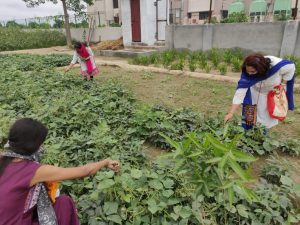
Harvest your own vegetables
KVK-IVRI Bareilly (Box1) has currently grown a variety of vegetables in its farm for demonstration purpose. Considering various problems arising out of COVID-19 lockdown and consumer fear of visiting markets or consuming market purchased vegetables, we conceptualized and implemented the “Harvest your own vegetable programme”. Since its launch on 21st May, 2020, at KVK-IVRI, Bareilly, the program has completed three weeks while being organized once a week every Thursday. Under this programme, vegetables and other farm produce grown in limited quantities (Table 1) at KVK farm was opened to consumers for harvesting and sale. We used to employ labour to harvest these vegetables, send it to ATIC for sale, engaging staff and incurring expenses and spending time. We believe this arrangement will save on labour charges, which at times is scarce. Also, the crop demonstrations are not affected as we are weighing the produce and keeping a record.
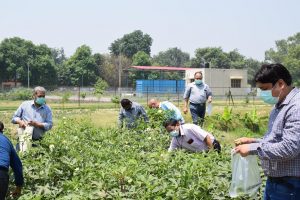
Table1: Sale of produce in three weeks
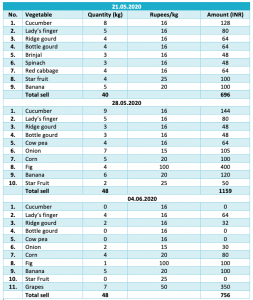
Consumers followed social distancing guidelines and wore masks while harvesting. About 35 men and women, who harvested and purchased vegetables, expressed satisfaction and congratulated KVK staff for the innovative practice. Their views were live-streamed; the event was posted on IVRI homepage and on Facebook.
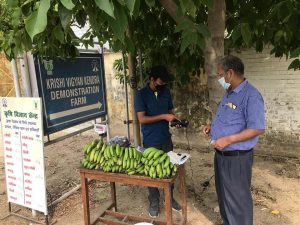
| Box 1. KVK-IVRI, Bareilly
One of the 713 Krishi Vigyan Kendras (KVKs) in India, Krishi Vigyan Kendra, ICAR-Indian Veterinary Research Institute, Izatnagar, Bareilly, was established in 1985. It is located on the main campus of the institute at Izatnagar. Like any other KVK, it is primarily mandated for technology assessment and demonstration for its wider application and to enhance capacity development (TADA-CD), horizontal expansion of proven agricultural technologies through on-farm testing (OFT), frontline demonstrations (FLDs), farmers’ trainings, vocational trainings for rural youth and farm women, interactive meetings between scientists and extension functionaries, field days and Kisan Melas. The KVK has a crop cafeteria and produces seeds of wheat, paddy and mustard for National Seeds Corporation in its 21-acre farm. The KVK farm also raises poultry, ducks, fish and grows vegetables and fruits in limited quantities for demonstration purposes and occasional sale. |
While inaugurating the programme, Dr R K Singh, Director, IVRI, appreciated the KVK for the innovation and encouraged the KVK to take it forward by developing KVK farm as an agri-tourism centre, an idea supported by ICAR. Farmers visiting the farm may be apprised about new ways of income making like rural/agro tourism and home stays etc. to generate additional income.

To empathise with farmers while availing fresh local produce at low cost, consumers may like to align with farmers, in a way similar to the concept of Community Supported Agriculture (CSA). CSA is popular among consumers of organic foods. Also, harvest festivals can be organized to promote local sale, which is good for local economic growth. Problems from COVID-19, mainly problems in farming activities including marketing of farm produce, has led to some welcome initiatives globally. In Bangladesh, to support farmers distressed due to lockdown, students came forward to help in harvesting rice and marketing vegetables. Linking farmers to markets is currently recognized as one of the mandates of extension and advisory services. KVKs can promote local WhatsApp groups linking producers to consumers, especially those living in housing societies/flats. Farmers too are increasingly interested in eliminating middlemen and branding their commodities to gain more. Such initiatives could be the new normal in days to come.
Excellent support and motivation from Dr R K Singh, Director of the KVK host institute i.e. ICAR- Indian Veterinary Research Institute helped in initiating the programme.
 Dr Mahesh Chander is Principal Scientist, Head & Joint Director of Extension Education at ICAR- Indian Veterinary Research Institute, Izatnagar-243 122 (UP), India.(Email: drmahesh.chander@gmail.com)
Dr Mahesh Chander is Principal Scientist, Head & Joint Director of Extension Education at ICAR- Indian Veterinary Research Institute, Izatnagar-243 122 (UP), India.(Email: drmahesh.chander@gmail.com)
 Dr Raj Karan Singh is Senior Scientist & Head, Krishi Vigyan Kendra, ICAR- Indian Veterinary Research Institute, Izatnagar-243122 (UP) India. (Email: rksingh3@gmail.com)
Dr Raj Karan Singh is Senior Scientist & Head, Krishi Vigyan Kendra, ICAR- Indian Veterinary Research Institute, Izatnagar-243122 (UP) India. (Email: rksingh3@gmail.com)


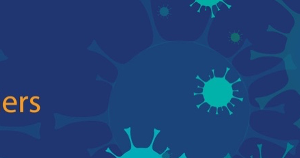
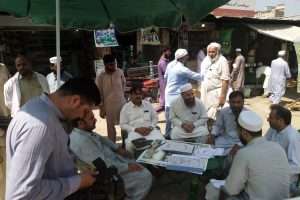

Very nice sir . It is a good model and needs to be replicated by other KVKs also
Nice initiative Mahesh Chander, Sir. An interesting way to engage public with the activities our institutes.
A much needed step sir…. each KVK should adopt this strategy to provide opportunities for consumers to engage in agricultre activities as well as also provide fresh farm produce to consumer